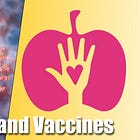The Truth About Measles: What Really Reduced Mortality?
Natural Immunity, Public Health, and the Measles Vaccine: What the Data Reveals
The recent news in Texas, suggesting that a reduction in vaccine uptake has caused a measles outbreak, is causing widespread fear. However, Measles has a low fatality rate, can be treated and has historically been countered by good sanitation. Now is not the time to panic!
Understanding Measles Beyond the Narrative
Measles is often portrayed as a dangerous disease eradicated by vaccines, but historical data tells a more nuanced story. While measles is a contagious viral illness, its mortality rates had already declined by 98% before the introduction of the measles vaccine. This decline was largely due to improvements in sanitation, clean water, hygiene, and nutrition.
How Measles Spreads and Progresses
Measles is caused by an RNA virus and spreads through respiratory droplets from coughing and sneezing. Once infected, a person undergoes a 10–12 day incubation period, during which they show no symptoms and are not contagious.
The disease then progresses through stages:
Initial Symptoms: Runny nose, cough, slight fever, and red, light-sensitive eyes.
Infectious Period: From about five days before the rash appears until five days after.
Rash and Koplik Spots: A red, slightly raised rash spreads from the face to the limbs. Small white spots, known as Koplik spots, may appear inside the mouth.
Historical Decline in Measles Mortality
In the early 1900s, measles had a mortality rate of 12–13 per 100,000 people. However, due to public health advancements, deaths from measles dropped dramatically before the vaccine was introduced. The vaccine arrived only after a 98% reduction in fatalities had already occurred.
Natural Immunity vs. Vaccine-Induced Immunity
A key distinction is that natural infection provides lifelong immunity, while vaccine-induced immunity wanes over time—about 10% per year, leaving individuals vulnerable within a decade. This raises important questions about long-term protection and dependency on booster doses.
Supporting Immune Health Naturally
Rather than relying solely on vaccines, a strong immune system is crucial. The "NEW START" principles offer a foundation for resilience:
Nutrition: A balanced diet supports immunity.
Exercise: Regular physical activity strengthens defenses.
Water: Hydration is key for bodily functions.
Sunshine & Vitamin D: Essential for immune regulation.
Temperance: Avoid harmful substances.
Air: Fresh air promotes respiratory health.
Rest: Sleep is critical for immune function.
Trust & Spiritual Health: A positive mindset contributes to well-being.
With these principles in place, the need for mass interventions diminishes, and a do-no-harm approach remains paramount in public health decisions.





